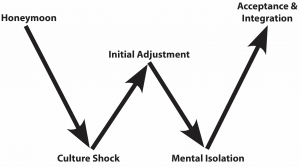Does the following sound familiar?
Your student was so excited to come to MLC. And the first few days were great! Orientation was fun. They met cool people at the mixer. Their classes sounded interesting, and the profs were nice. They felt like real college students. Wow! Things were good. Then . . . CRASH!
For some students, going away to college is like going to a foreign country. They experience a kind of culture shock. Two psychologists, Zeller and Mosier (1993), found that students going to college for the first time experience a predictable pattern of stages called the W-Curve.
The Honeymoon: Before your students even arrived on campus, they probably felt excitement and positive anticipation. Then, if they felt welcomed and if they had a good time during orientation, the honeymoon continued. They probably found that older students were kind, professors were accessible, and, especially during the first week, campus itself seemed geared to their comfort. They may have found their first taste of freedom—from parental oversight and from the old social structures of high school—exhilarating. Yes, they may have felt nervous and homesick, but overall things were good.
Culture Shock: Soon the adrenaline wanes, and they realize they have to deal with a new reality: sharing bathrooms, getting along with roommates, missing Mom’s cooking, doing college-level work, and meeting yet more new people. It’s fun, yes, but exhausting too. Homesickness may increase as they long for the warm familiarity of the past. In lieu of going home, they bring home to them by stocking their rooms with high school memorabilia and photos of friends and family, and they may spend a lot of time communicating with a boyfriend or girlfriend at home.
Initial Adjustments: As students negotiate the adjustments necessary to deal with this new reality, they experience another emotional upswing. Yes, they can do this! Their roommates aren’t what they expected, but it’s going to be fine. The cafeteria is actually quite good, and they manage a B+ on a major test. They are back in the saddle, confident of their capabilities.
Mental Isolation: After being home for a longer break like midterm, Thanksgiving, or Christmas, they may feel caught between two worlds and belonging to neither. The dynamic at home may have changed while they were gone. A younger brother or sister has much of the family’s attention, a pet has died, they have less to talk about with their old friends, and their high school romance has tanked—and now they feel homesick for home, the home they knew, the home that isn’t there anymore.
And yet college doesn’t feel like home yet either. They may not have found a posse they’re completely comfortable with yet. They may be disappointed in how a class, an athletic season, a concert, or Homecoming turned out. They may be surprised that students at a Christian college sin. They may suddenly wonder whether their lifelong dream of being a teacher, pastor, or staff minister is still their dream. They feel isolated and alone.
This stage is really a second culture shock, maybe more difficult to weather than the first one. What students may need to do at this stage is to consciously decide to make this college thing work. With prayer and trust in God, they need to combine the best of the college culture with the best of the culture they grew up with. They need to discard old things they’ve outgrown and also new things they don’t want to own. They need to take a deep breath and embrace this new life, taking a courageous leap into that holy adventure called the future.
Acceptance and Integration: As they make these adjustments and spend more time at college—sometimes all it takes is time!—things get better. They develop more history with their friends here. They find a club or activity that really fits. They find a professor or staff member who kindly mentors them. In short, they feel connected.
In fact, someday they’re going to surprise you. As they’re packing up for a return trip to school, you may hear them say, “Well, I guess I’ve got to get back home.” Home! Try to see that not as an arrow to the heart, but as a sign that they’re adjusting, they’re finding a niche, they’re becoming independent, they’re happy—in short, they’re doing exactly what you hope and pray that they’ll do.




